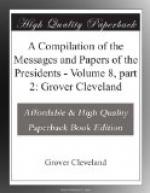nor have the exigencies of our new Government as
yet so far developed themselves as that we can know
to what degree we may or must have recourse to commerce
for the purposes of revenue. No common consideration,
therefore, ought to induce us as yet to arrangements
of this kind. Perhaps nothing should do it with
any nation short of the privileges of natives in
all their possessions, foreign and domestic.
It were to be wished, indeed, that some positively favorable stipulations respecting our grain, flour, and fish could be obtained, even on our giving reciprocal advantages to some of the commodities of Spain, say her wines and brandies; but,
First. If we quit the ground of the most favored nation as to certain articles for our convenience, Spain may insist on doing the same for other articles for her convenience, and thus our commissioners will get themselves on the ground of a treaty of detail, for which they will not be prepared.
Second. If we grant favor to the wines and brandies of Spain, then Portugal and France will demand the same; and in order to create an equivalent Portugal may lay a duty on our fish and grain, and France a prohibition on our whale oils, the removal of which will be proposed as an equivalent.
Thus much, however, as to grain and flour may be attempted. There has not long since been a considerable duty laid on them in Spain. This was while a treaty on the subject of commerce was pending between us and Spain, as that Court considers the matter. It is not generally thought right to change the state of things pending a treaty concerning them. On this consideration and on the motive of cultivating our friendship, perhaps the commissioners may induce them to restore this commodity to the footing on which it was on opening the conferences with Mr. Gardoqui, on the 26th day of July, 1785. If Spain says, “Do the same by your tonnage on our vessels,” the answer may be that “Our foreign tonnage affects Spain very little and other nations very much; whereas the duty on flour in Spain affects us very much and other nations very little; consequently there would be no equality in reciprocal relinquishment, as there had been none in the reciprocal innovation; and Spain, by insisting on this, would in fact only be aiding the interests of her rival nations, to whom we should be forced to extend the same indulgence.” At the time of opening the conferences, too, we had as yet not erected any system, our Government itself being not yet erected. Innovation then was unavoidable on our part, if it be innovation to establish a system. We did it on fair and general ground, on ground favorable to Spain; but they had a system, and therefore innovation was avoidable on their part.
THOMAS JEFFERSON.
ARTICLES PROPOSED BY DON DIEGO GARDOQUI TO BE INSERTED IN THE TREATY WITH THE UNITED STATES.




